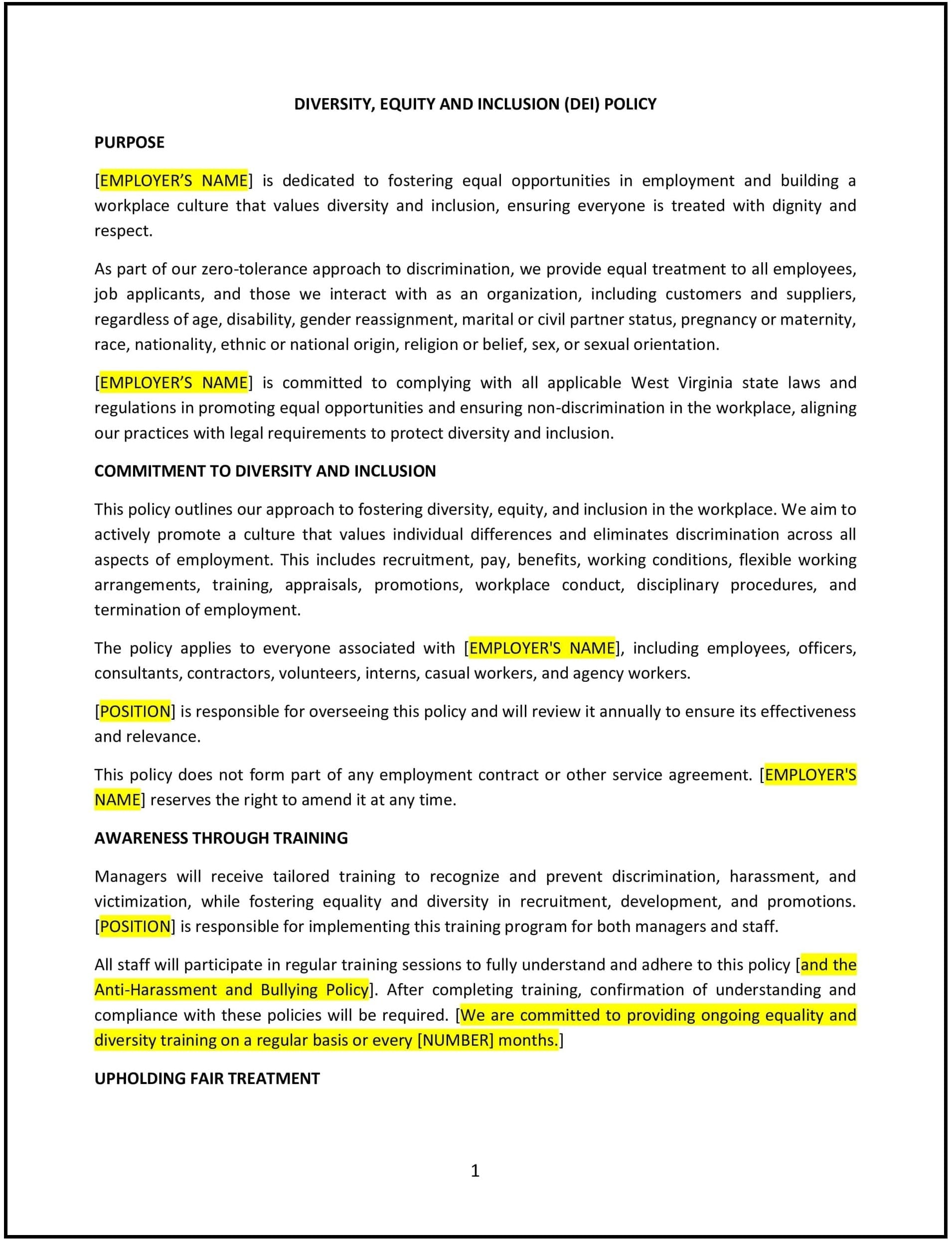Diversity, equity and inclusion (DEI) policy (West Virginia): Free template
Got contracts to review? While you're here for policies, let Cobrief make contract review effortless—start your free review now.

Customize this template for free
Diversity, equity and inclusion (DEI) policy (West Virginia)
A Diversity, Equity, and Inclusion (DEI) policy helps West Virginia businesses foster a workplace that values diversity, ensures equitable treatment for all employees, and promotes an inclusive environment where every individual can thrive. This policy outlines the company’s commitment to diversity in recruitment, employee development, leadership opportunities, and creating an atmosphere of respect and belonging for employees from all backgrounds.
By implementing this policy, businesses can attract a diverse talent pool, improve employee engagement and retention, and create a more innovative and collaborative work environment.
How to use this diversity, equity and inclusion (DEI) policy (West Virginia)
- Define diversity, equity, and inclusion: Clearly define what each term means in the context of the company and the policy, such as diversity referring to the presence of different backgrounds, equity meaning fair treatment, and inclusion referring to the creation of an environment where all employees feel valued and respected.
- Commit to diverse hiring: Establish a commitment to hiring employees from diverse backgrounds and ensuring that recruitment practices are inclusive and non-discriminatory.
- Promote equitable opportunities: Outline how the company will provide equal opportunities for all employees, including in areas like training, promotions, and leadership development, ensuring that all employees have the chance to succeed.
- Foster an inclusive culture: Provide strategies for promoting inclusion within the workplace, such as employee resource groups, diversity training programs, mentorship opportunities, and other initiatives that ensure all employees feel welcomed and valued.
- Set clear expectations for behavior: Define the expected behaviors for employees regarding diversity and inclusion, emphasizing respect for differences, cultural sensitivity, and avoiding discrimination or harassment.
- Address discrimination and harassment: Clearly outline the company’s zero-tolerance policy for discrimination and harassment based on race, gender, sexual orientation, religion, disability, or any other protected characteristic, and the steps for reporting and addressing any violations.
- Measure progress: Establish mechanisms for tracking the company’s progress toward diversity and inclusion goals, including regular assessments, feedback from employees, and monitoring key metrics.
Benefits of using this diversity, equity and inclusion (DEI) policy (West Virginia)
This policy offers several benefits for West Virginia businesses:
- Attracts diverse talent: A clear DEI policy helps the company attract a broad range of qualified candidates from diverse backgrounds, expanding the talent pool.
- Enhances innovation: A diverse workforce brings a variety of perspectives, which fosters creativity, innovation, and better problem-solving within the company.
- Improves employee engagement: Employees who feel valued and included are more likely to be engaged and committed to the company, leading to higher job satisfaction and retention rates.
- Promotes a positive workplace culture: An inclusive environment where all employees feel respected and heard improves morale and encourages collaboration among teams.
- Reduces legal risks: A strong DEI policy helps the company comply with anti-discrimination laws, reducing the risk of lawsuits and reputational damage.
Tips for using this diversity, equity and inclusion (DEI) policy (West Virginia)
- Communicate the policy clearly: Ensure that all employees understand the company’s DEI commitments and their role in fostering a diverse and inclusive workplace.
- Provide training: Offer ongoing DEI training for all employees, focusing on topics like unconscious bias, cultural competency, and respectful communication.
- Encourage feedback: Create opportunities for employees to share their experiences and provide feedback on the company’s diversity and inclusion efforts, helping the company improve its policies and practices.
- Monitor progress: Regularly assess the company’s DEI initiatives, track progress toward diversity goals, and make adjustments as needed to ensure continued improvement.
- Foster a safe space: Ensure that employees feel comfortable reporting incidents of discrimination or harassment, and that the company responds promptly and effectively to address any concerns.